Women in Technology
I gave this talk at the InspireWIT Women in Technology conference for students at Nottingham University on 15 Nov 2014.
The theme: women inspiring women
The brief: talk personally and frankly about yourself, about your education and experiences of being in the technology industry.
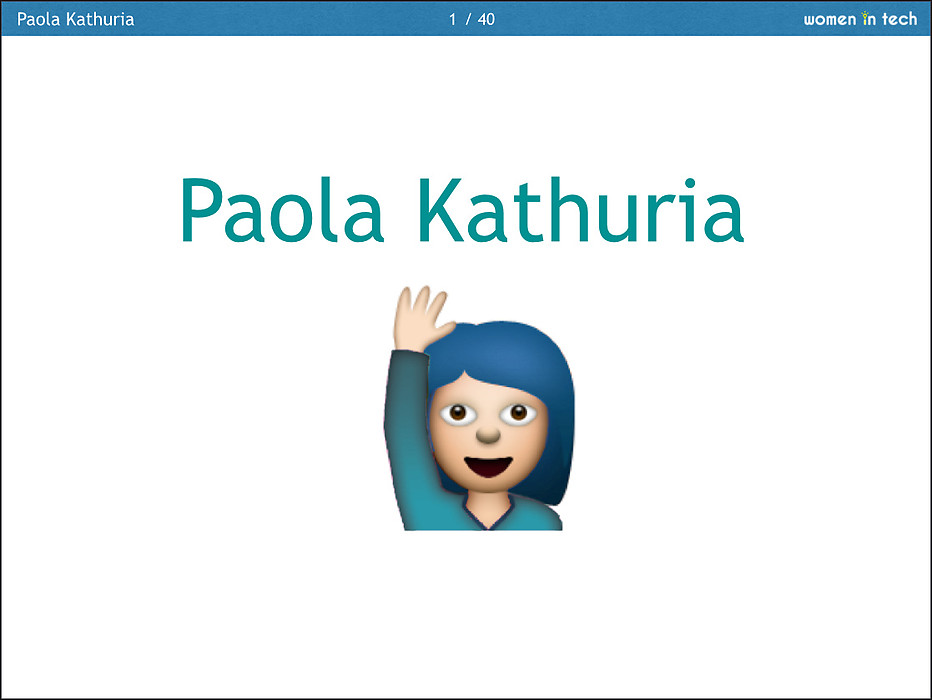
My name is Paola Kathuria. I was one of the first web developers in the UK.
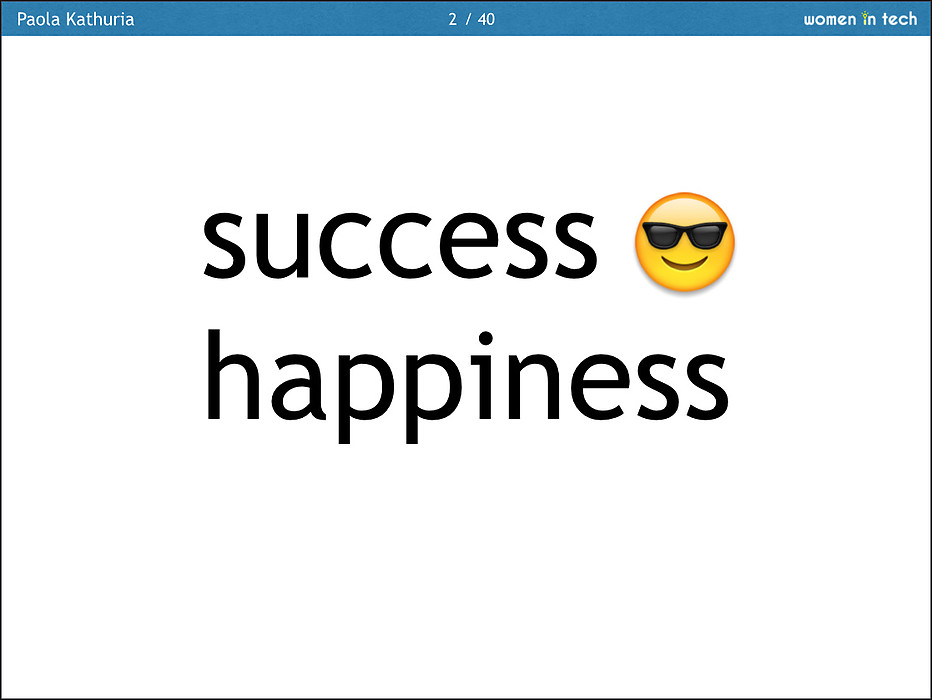
You’re entitled to success.
You’re entitled to happiness.
However, I think that this kind of message has lost its meaning.
I’m going to share experiences from my education and career so that you can better understand the context when people like me tell young people like you to follow your dreams.
But first, I’m going to share some of the replies I received when I asked people online what advice they would give you.
From a user experience researcher:
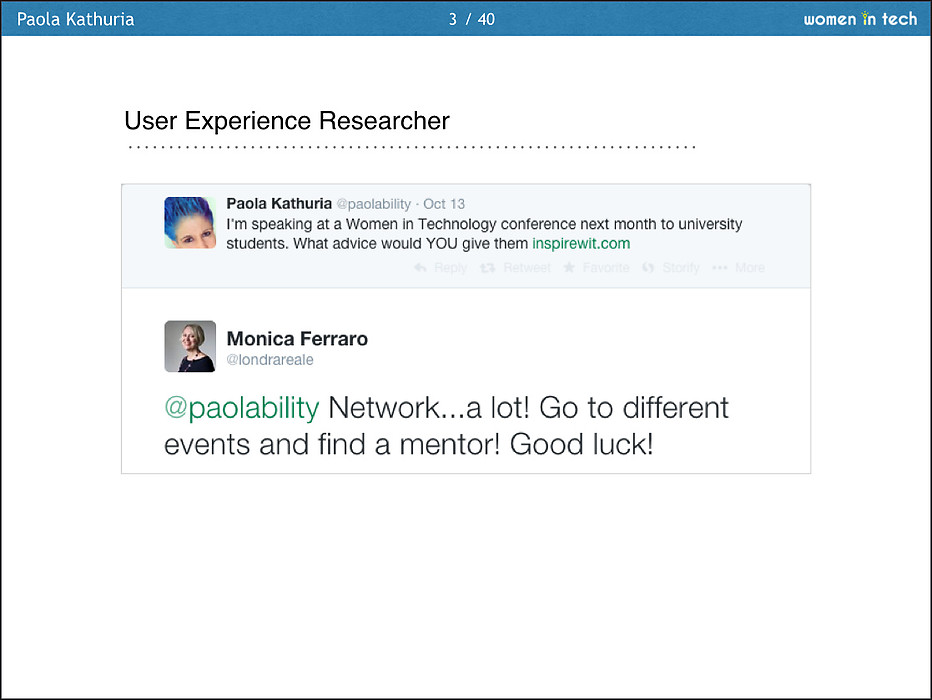
Network & find a mentor.
From a project manager:
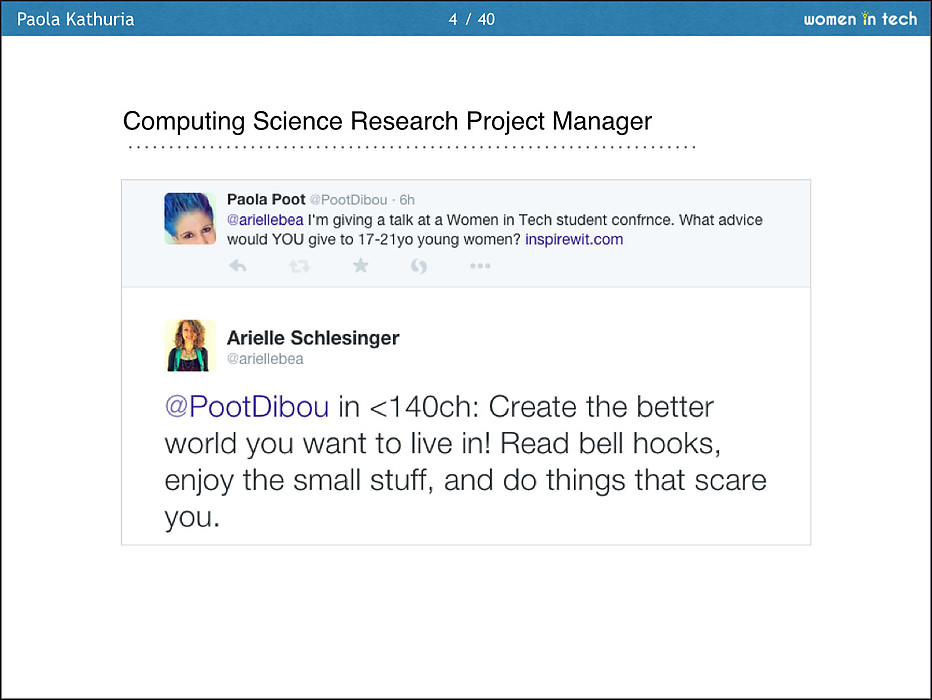
Do things that scare you.
And from a male troll:
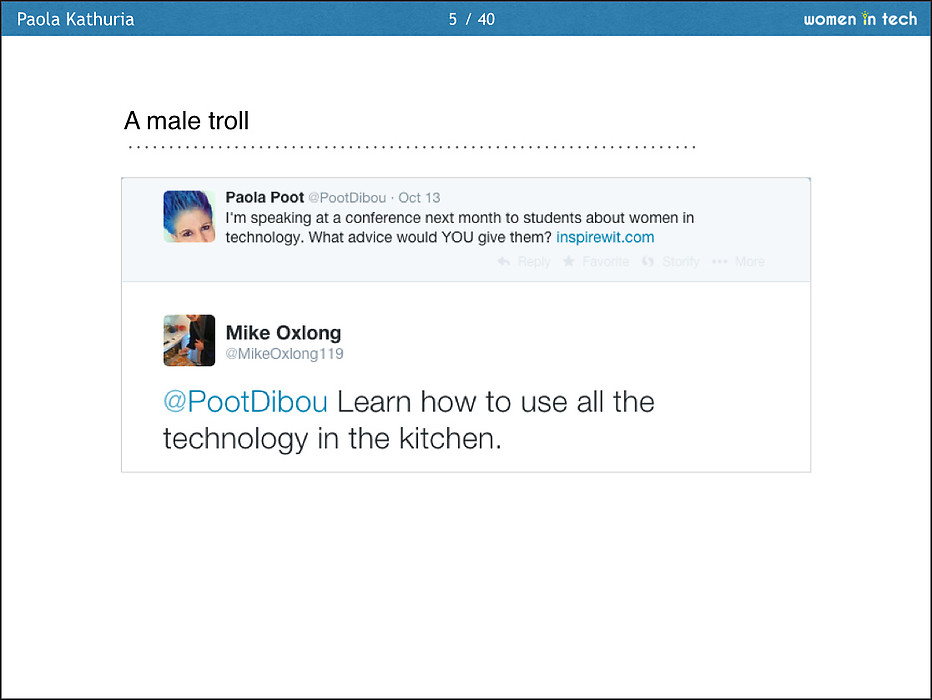
[...]
Sexism is like death by a thousand cuts.
This “joke” about a woman’s place being in the kitchen is one of many small jabs you will experience in your life.
Each jab is designed to dent your confidence.

Each jab is a reminder of the restrictive role expected of girls: make yourself pretty, fall in love and get married.
Babies are even colour-coded so that people know whether to say “what a pretty girl” or “what a strong boy!”.
This kind of messaging continues throughout our lives - in clothes, in toys, on TV, in music, in adverts and in the language we use.
We have all been trained.
However, we are also the trainers.
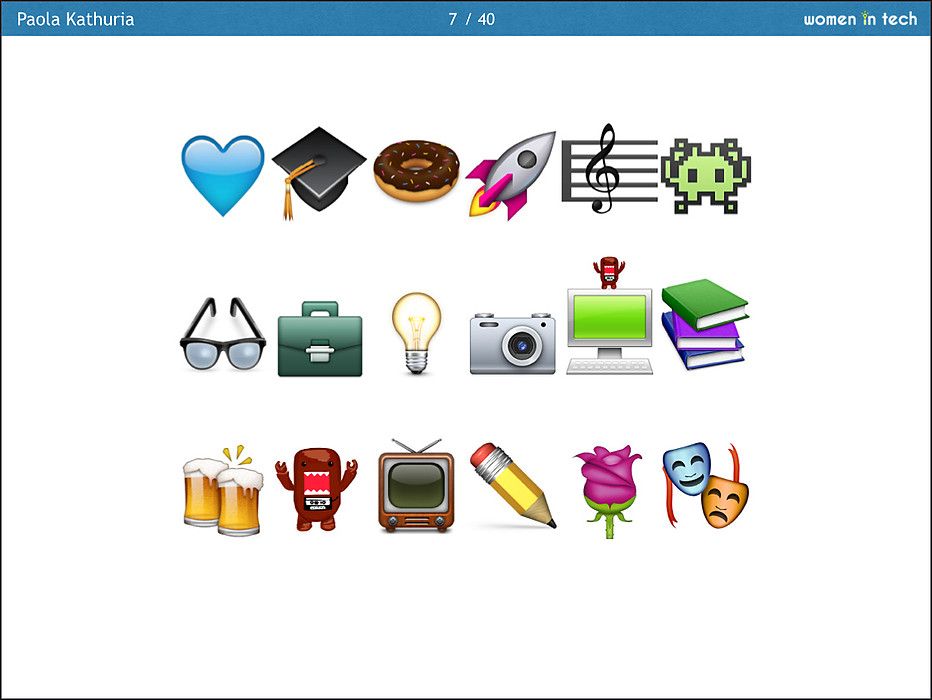
This is who I am in Emoji.
- turquoise
- science fiction
- film music
- video games
- business improvement
- toy photography
- flowers
- musicals
Who are you in Emoji? :-)
Here is some more advice.
This from a female games developer:
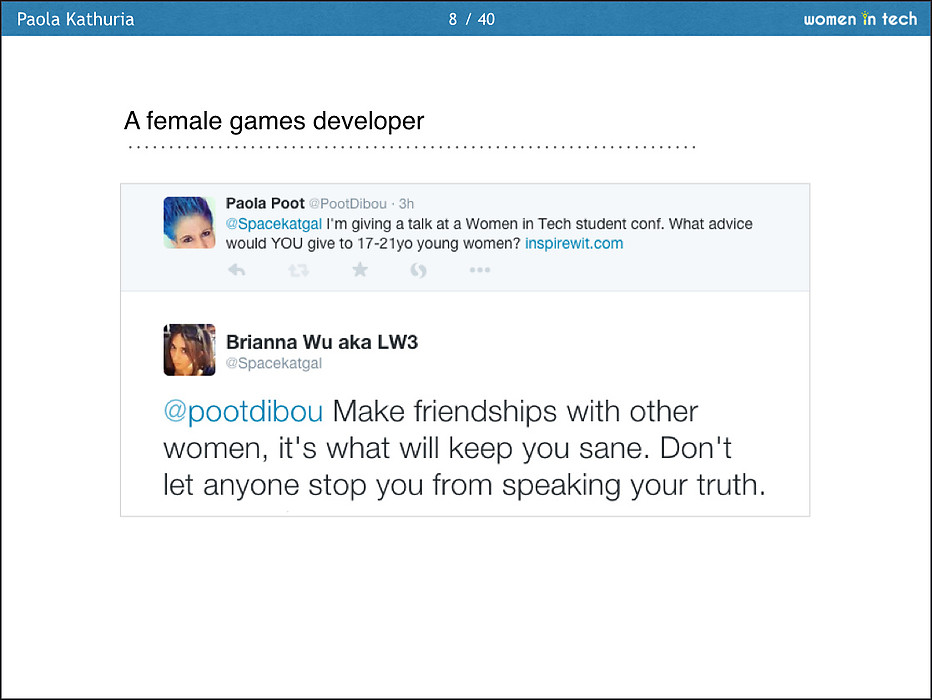
Don’t let anyone stop you from speaking your truth.
And from another female programmer:
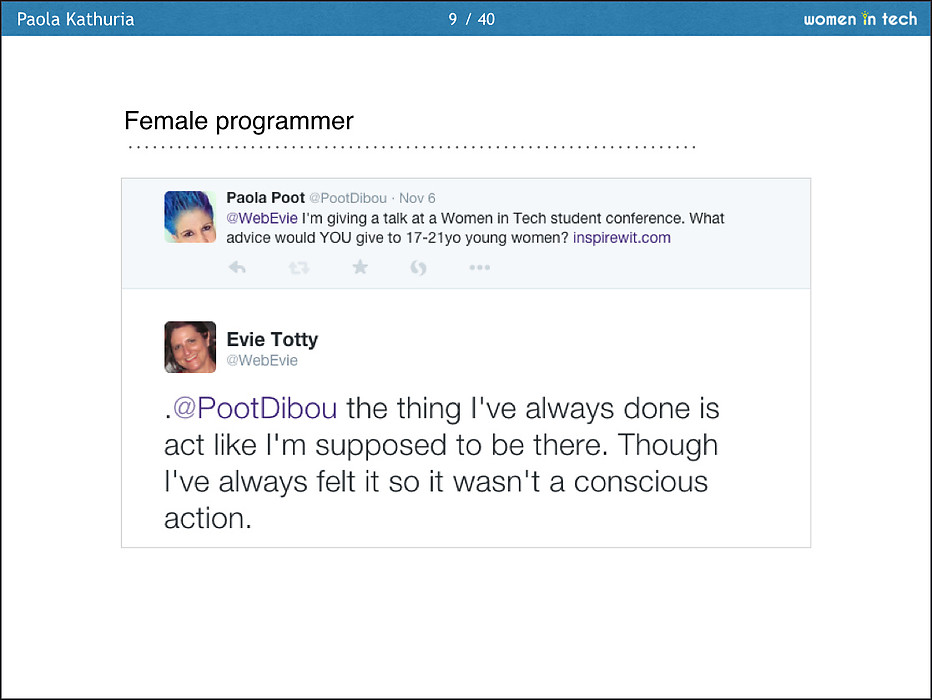
Know that you’re supposed to be there.
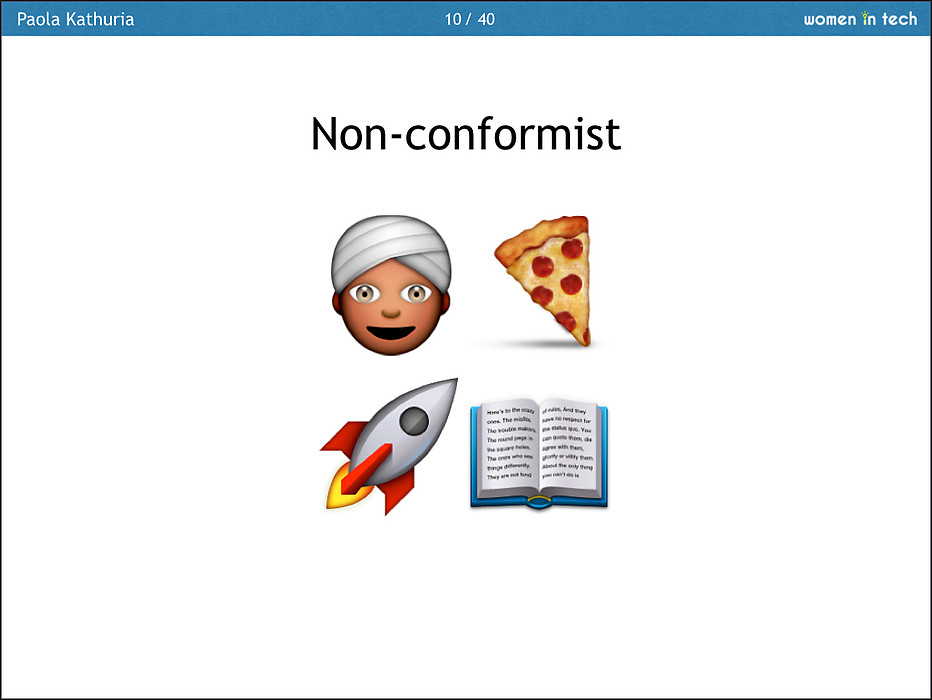
I’m half Italian and half Indian. I started off as a hybrid - it made me open-minded. Being an open-minded hybrid has been a theme that has continued throughout my life.
I got into science fiction when my brother gave me his books when I was 13.
I went to a girls school. We didn’t have computers in schools in the 1970s. My Indian father encouraged me to do maths and science.
Most girls at my school left at 15. Only 6 girls out of my year went to university.
One who wanted to do medicine was discouraged by the careers advisor who said it was too hard.
The careers advisor was a woman.
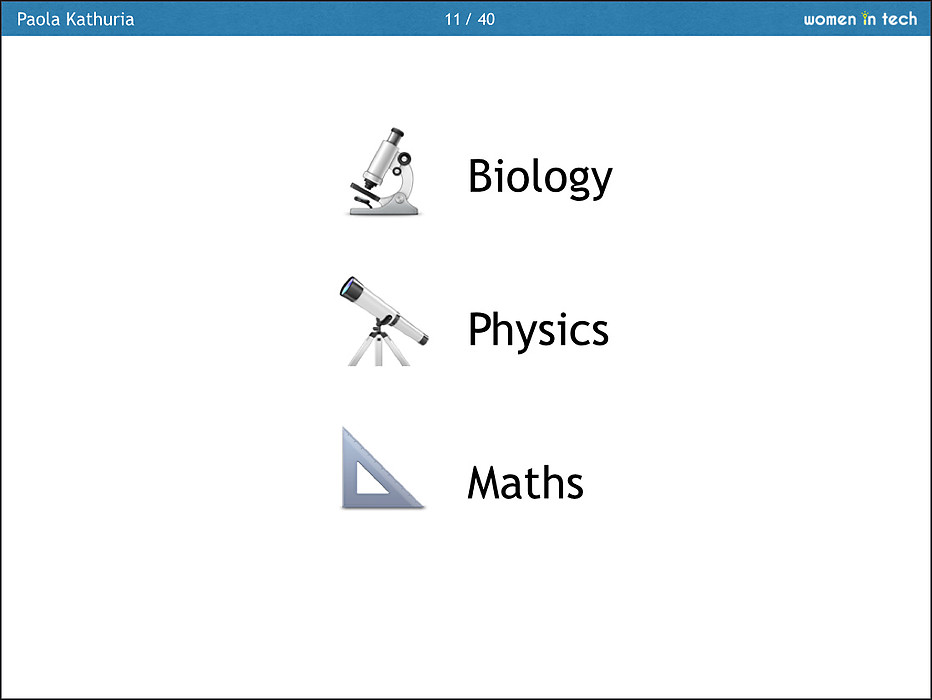
I took ‘A’ levels in Biology, Physics and Maths.
I was really bad at Physics. I didn’t speak up in class when I didn’t understand something which meant I got left behind.
My shyness and low self-esteem at the time stopped me from asking my teacher for help. I’m sure she would have helped me catch up if I had asked.

I went to the Physics open day at York University.
I didn’t feel I had anything in common with the people there. It didn’t feel right.
I had accepted a place at Leeds University for Biophysics & Maths.
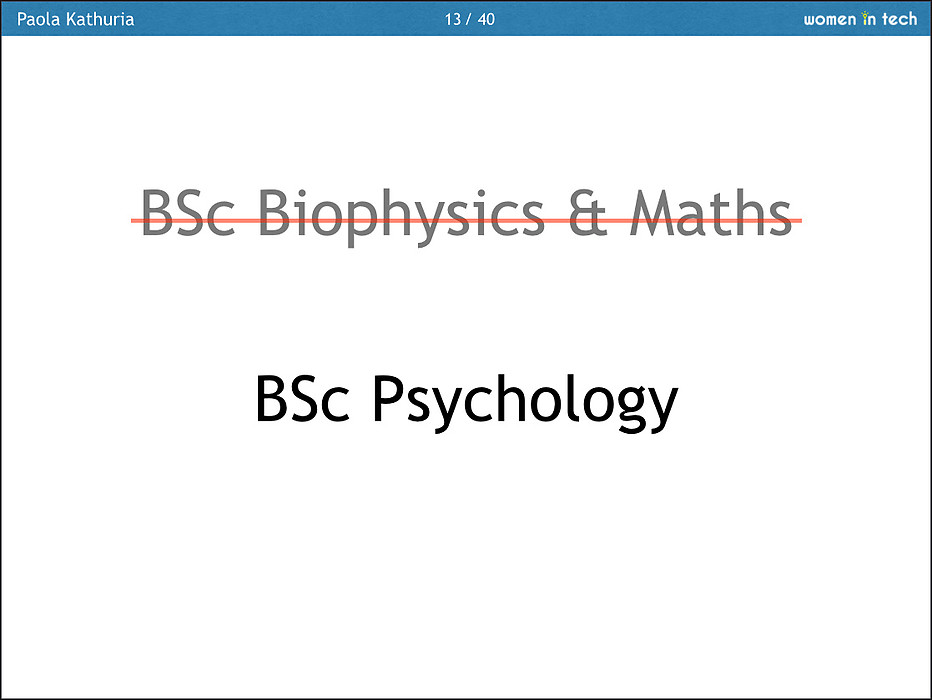
I secretly wrote to Leeds and got my offer swapped to Psychology before I arrived. I wanted to know what made people tick.
My parents and physics teacher weren’t pleased. My dad said that psychology is what people do when they can’t get into medicine.
My parents wanted me to do physics so they could boast about me to their friends. However, I realised that I wouldn’t be happy if I lived their aspirations rather than my own.
Doing psychology was one of the best decisions I’ve ever made. It’s always been useful.
For one of my final year options, I chose programming. They taught us BASIC.

I remember looking at this on the board in a class and wailing quietly to myself.
To someone with a maths background, this looks like an equation. But it’s not. The difficulty I had in “getting it” wasn’t because I was stupid but because the language itself is badly designed.
This is an assignment statement. The equals sign doesn’t mean equivalence. It means “becomes”.
A is a variable (think of it as a named container). Find out what value is in A. Add one to it. Over-write the value currently held in A.
It’s not intuitive because we read left-to-right. The result should be on the right, not the left.
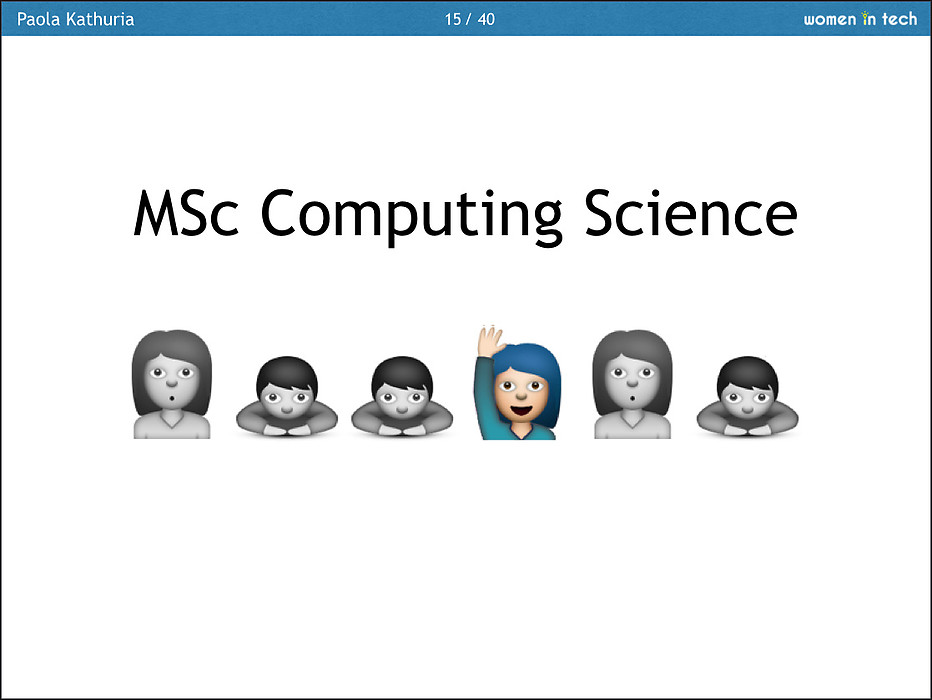
I wanted to do a PhD in applied computing to psychology. However, you can’t apply for a PhD with a 2ii.
I got a 2ii in my psychology degree because I didn’t know I was smart. I thought I was mediocre. It never occurred to me to work hard at my degree. I thought that good degrees were what other people got.
I got a place on a Masters course, for people who had a first degree in anything other than computing.
Because of my head start in programming, I ended up helping my fellow students in projects. I became better at explaining and better at programming as a result.
On the Masters, I learnt COBOL, Pascal, Fortran, Prolog, 6502 Assembler and two simulation languages. I developed a simulation of a taxi service.
Stafford was a Polytechnic at the time. The 18-month Masters included 6 months in industry.
It's one thing to be taught how things should happen, another to experience how it works in reality, when ego and insecurity and office politics are involved.
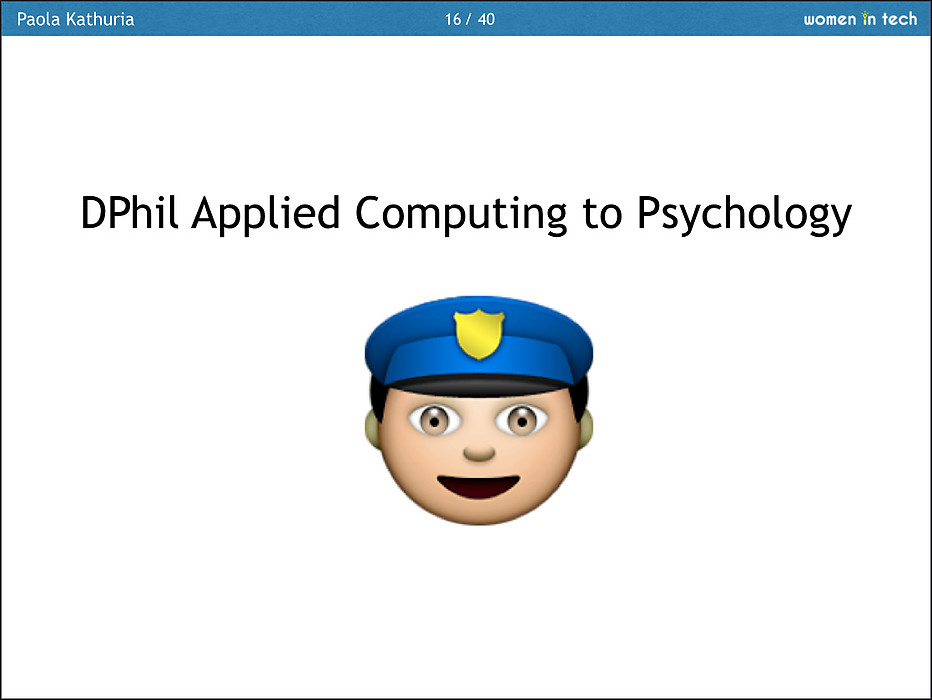
I got a place at the University of Kent at Canterbury for a DPhil in Applied Computing to Psychology. I had a female computing supervisor and male psychology supervisors.
I wanted to research cognitive psychology, using computers to build mental models. However, in my first year, my psychology supervisor persuaded me to computerise the Police Custody Record. This is the form the police have to fill in when somebody is in custody.
I designed, built and documented it by myself. I learnt TurboPascal to build it.
It was presented at a national police conference on computer-based tools. My psychology supervisor took all the credit.
In my second year, I still wanted to research cognitive psychology. However, my next psychology supervisor persuaded me to research how people used the library search engine.
I found that some people use too few keywords and get a lot of search results, whilst some people use too many and get no results. Hmmm!
I didn’t think that these “research findings” were worthy of a Doctorate.
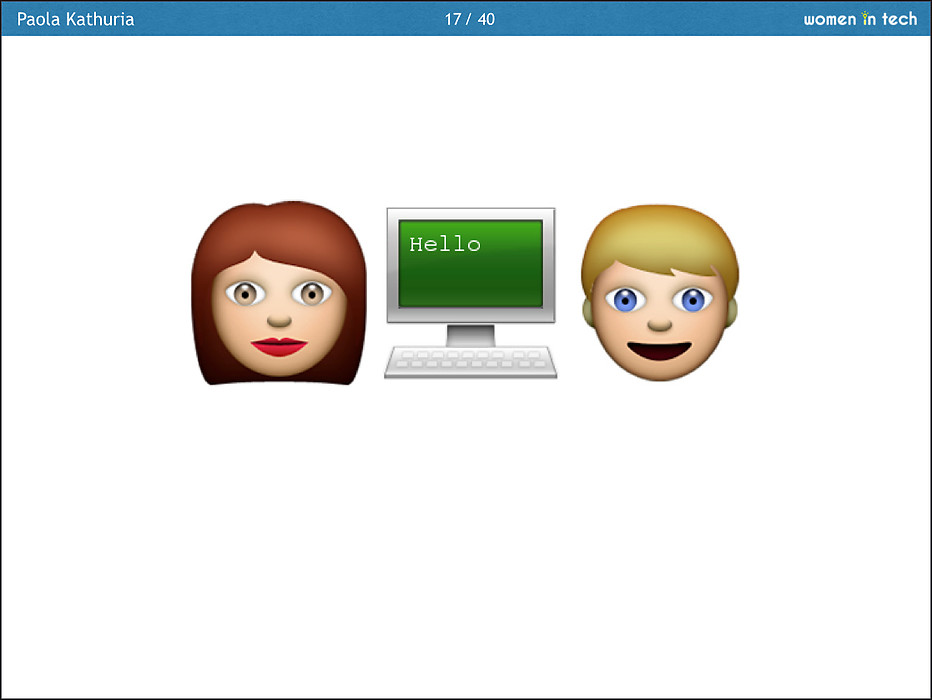
Before Tim Berners-Lee invented the web browser and HTTP there were 30 million people already online using text-based bulletin boards, text-based chat and e-mail.
In January of my second year, I posted a question to a general chat board: "What word in the English language has the most consecutive consonants?”
I struck up my first ever e-mail correspondence with one of the guys who replied.
It was 1988. In three months we exchanged in e-mail the equivalent of a full-length novel.
I arranged to meet him in Leeds where he worked, on the pretext of going to a psychology conference.
The day before I left for Leeds, my supervisors said they didn't think I was going to complete my DPhil. I was to leave at the end of the second year and could write up as an MPhil.
I met Frank on a Thursday. By the Sunday, we'd agreed to move in with each other. We're still married.
I never wrote up my work as an MPhil. I had no pride in my research.
Realising that I could choose not to was a revelation.
Giving yourself permission to do - or not do - something is very powerful.
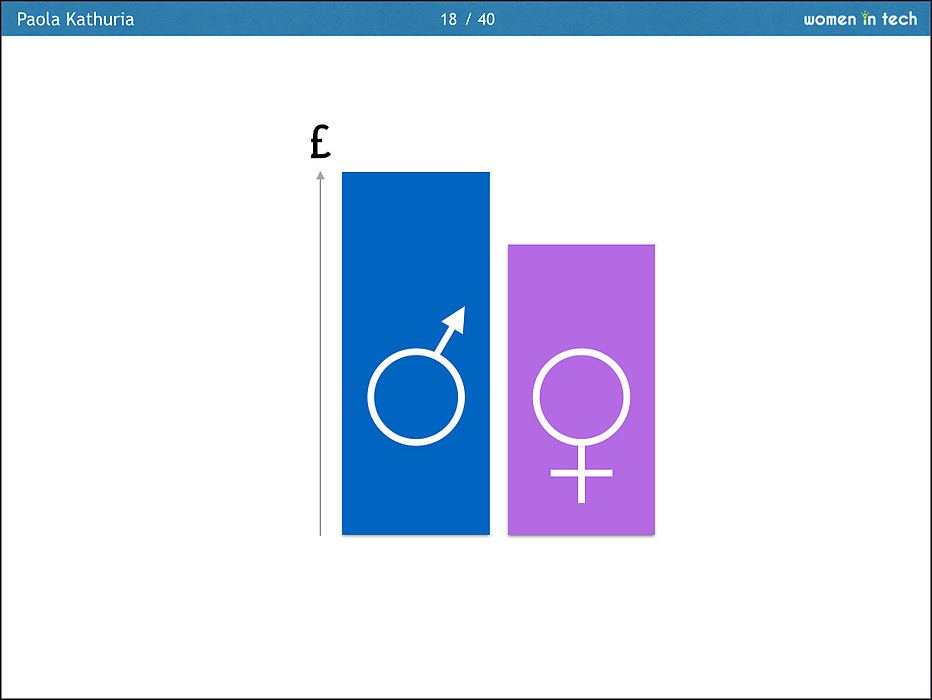
I got a job as a trainee C programmer at the company Frank worked at.
A guy started the same week in the same position as me. I later found out that he was being paid 25% more than me.
I'm sure that the salary difference was due to gender discrimination. However, there was another factor. He had lied in the interview.
We had been asked in our interviews whether we knew the operating system, Unix.
I had used Unix for two years at university as a user but not as a Unix developer. I therefore downplayed my Unix experience at the interview.
When my male colleague was asked at his interview whether he knew Unix, he said yes.
He was lying. He had never used Unix at all.
That was in 1989.
Here’s what a senior female technical engineer told me last week:
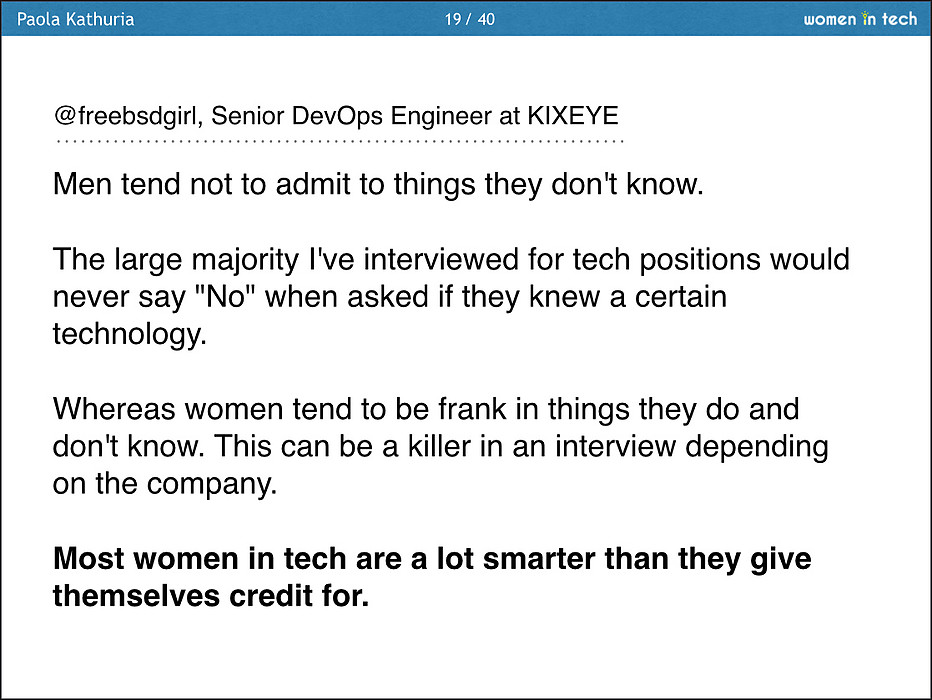
When I asked a sysadmin for help setting up my workstation at my new job, he came over to my desk and did it all for me without explaining what he was doing. This happened in later jobs, too. Maybe they thought they were being helpful, but it kept me ignorant.
To this day, I still don’t feel confident around hardware. :-/
In this job I learnt C, SQL and Curses (for creating text-based interfaces).
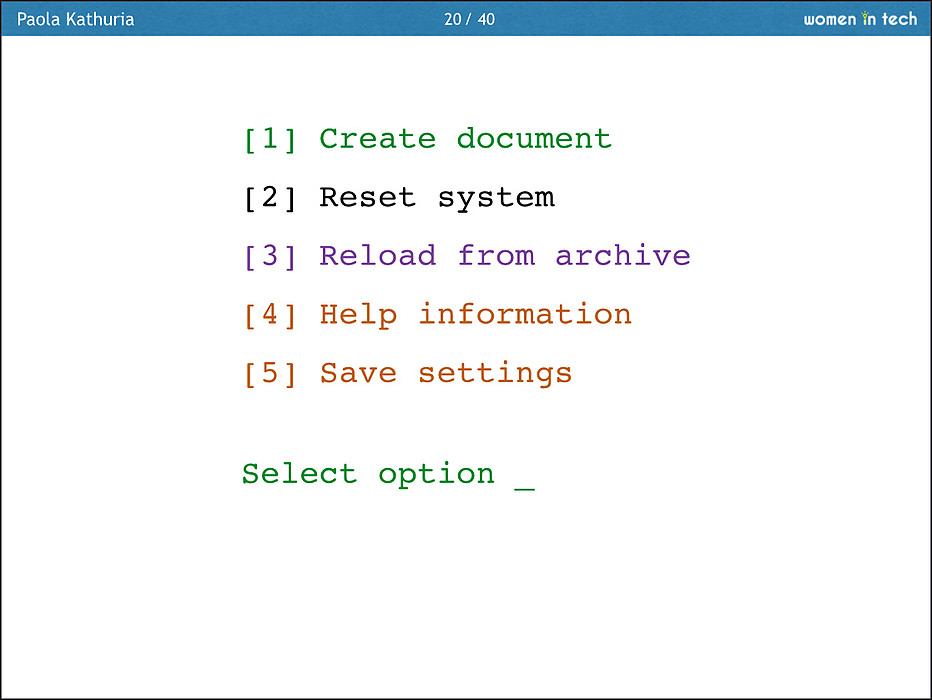
I learnt good user-interface design from the bad design, like this, by my colleague, the guy who had lied in his interview.
I realised that colour should be used to group similar items. Different colours for no reason adds unnecessary complexity.
I noticed a lot of mistakes in my colleague's work. I explained to our manager why it was a problem. I was told to fix my colleague's mistakes but not to tell him in case it “hurt his feelings".
I felt humiliated. I felt unappreciated. The experience didn't do my self-esteem any good.
I left after a year to create a start-up with other good people from that company.
More from @freebsdgirl
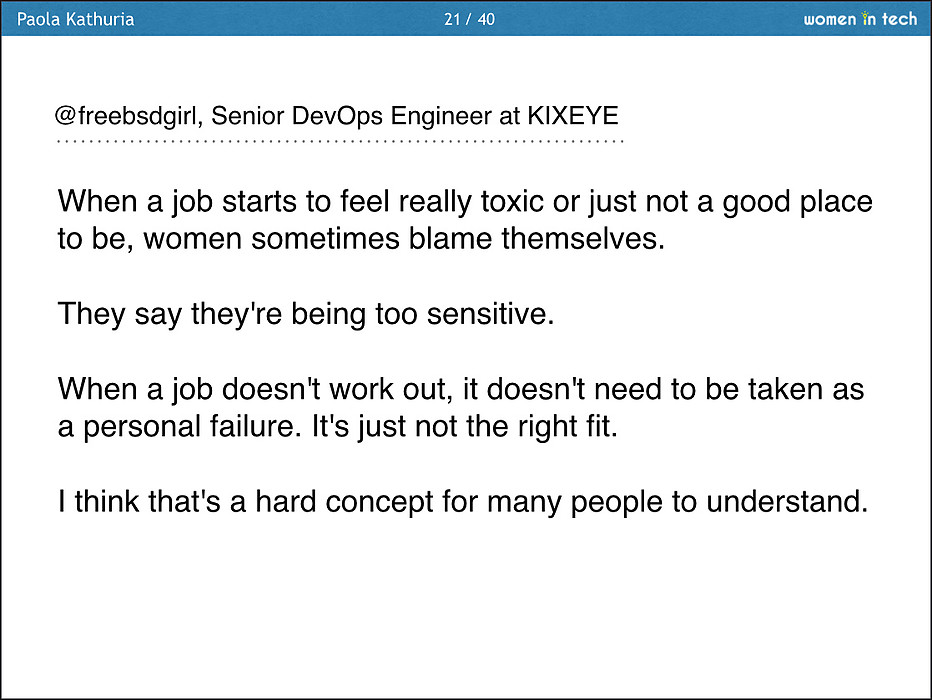

I recently attended another Women in Technology event, at a high school for girls.
I wanted to see what the speakers from various companies and organisations said to the girls. I also wanted to see the girls’ reactions.
I was watching their faces during one particularly inspirational talk about the achievements of women in various industries. The speaker told the girls to follow their dream, to aim high, to shoot for the moon.
The girls didn’t look inspired. They looked bored, as if they’d heard it often before and that the words had lost their meaning.
I thought about it afterwards and realised that the girls - and maybe you, too - might be missing some crucial context.
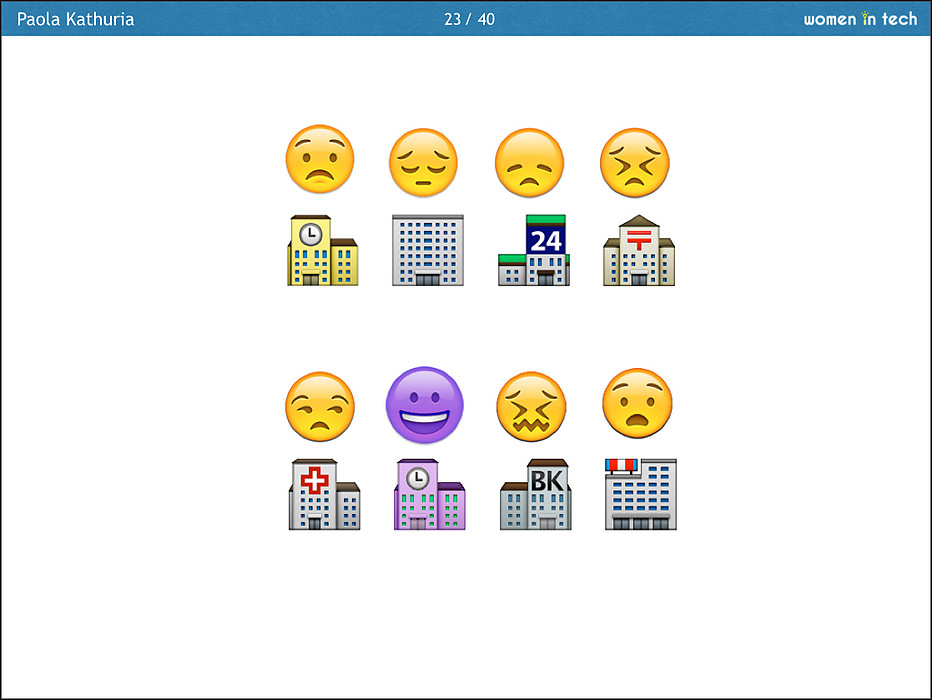
Most people are unhappy in their jobs.
They don’t look forward to going into work. They can’t wait till they can leave the office.
At my last two contracts, many of the designers and developers sat slumped in their chairs. Wearing headphones - cutting themselves off from their team - they’d spend hours on Facebook, watching videos on YouTube, chatting in Skype or shopping online.
Is that why you went to school and university? To find all the ways you can look busy while you wait for the time before you can escape?
No.
Of course not.
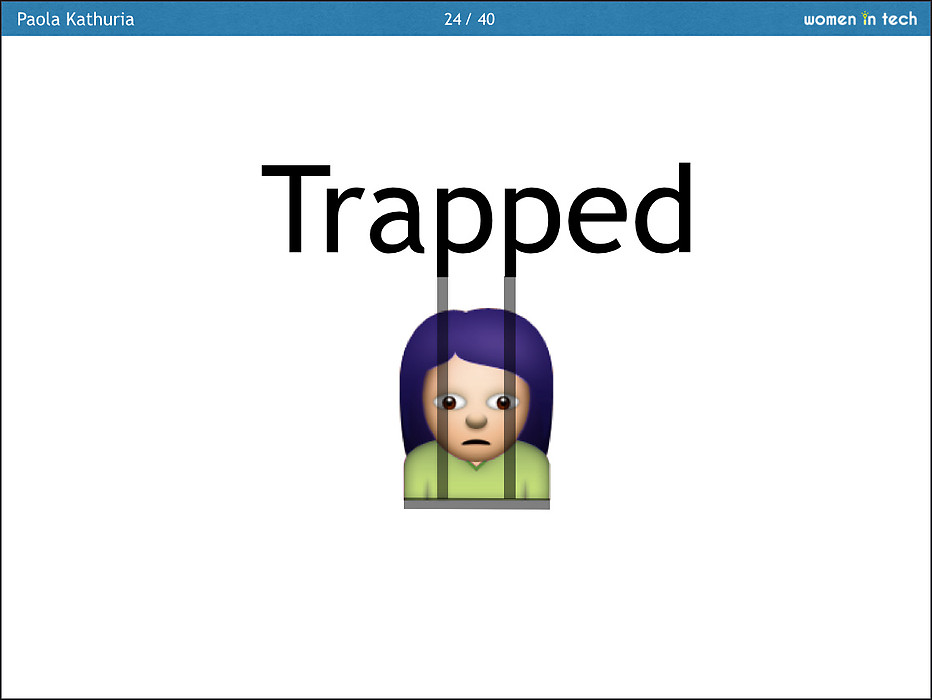
There are various reasons why people stay in places they know are wrong for them:
- they feel guilty
- they’re afraid of letting their family down
- they think that leaving is making a fuss (that they’re not worth it)
- they feel embarrassed because they made a mistake
- they believe that it will be just as bad, if not worse, somewhere else
Don't be that person who doesn't really want to be in their job. The developer who’s stopped caring about software quality, the user experience designer who doesn't really care about users, the manager working against the company’s goals.
You are our future designers, developers and managers. For our sake and yours, find a job you enjoy doing, that you will therefore do well, and where you design and build products and services which delight your users.
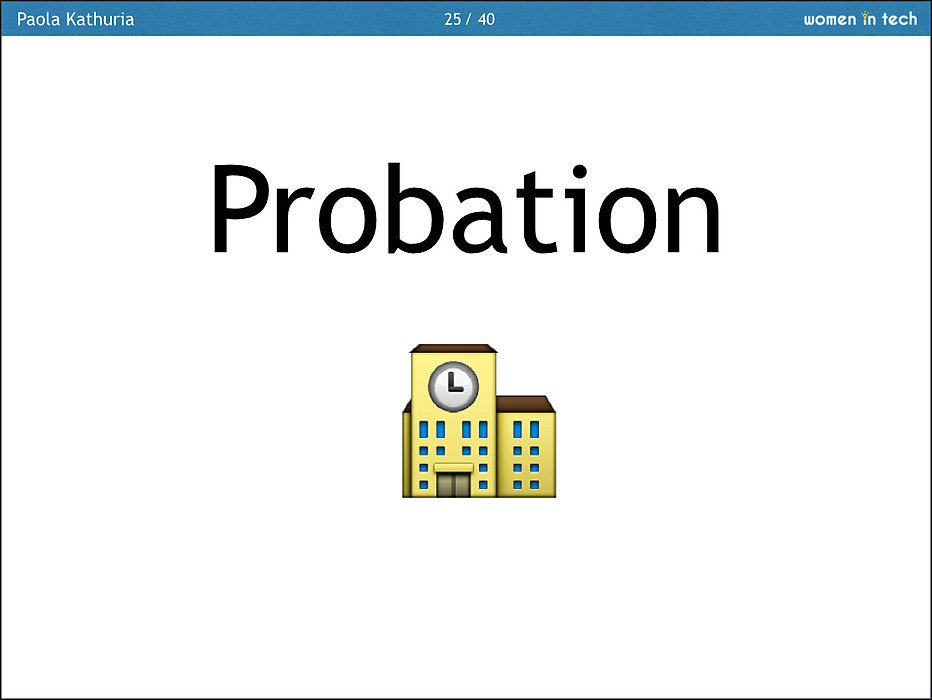
When you start any job, you’ll have a probation period. That’s full pay but with a very short notice period. This is for the company to find out if you're right for the job.
You must use this period to find out whether the company and job is right for you.
You will be able to tell in 2-3 weeks if you’re in the wrong place.
Do the people who work there want to be there? Do you feel that you are respected and listened to? In meetings, do people let you speak or do they talk over you? Do people arrive at meetings on time or do people wander in late with no apology? Do people participate in any activities outside work (pub, sports, board games, a work choir)?
If you realise that you’re in the wrong place, use your probation period to gain as much experience and skills as you can. Think about what it is that you don't like about the job or the company so that you can formulate a question at interviews and avoid a similar situation.
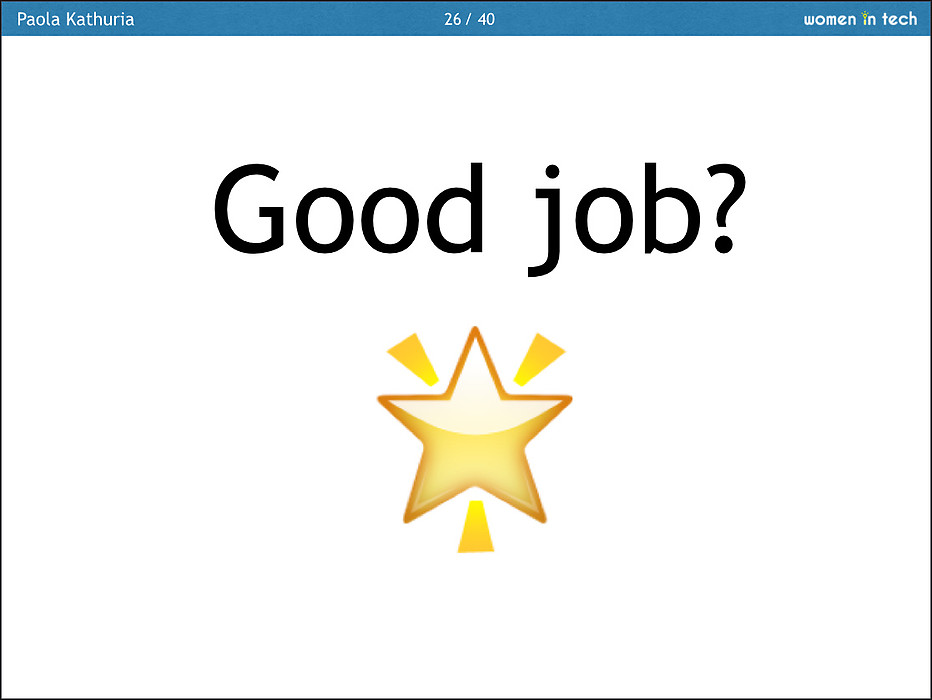
My bug bear is ignoring expert opinion. So I have a question that I ask at interviews:
After a project has ended, how do you know that you have done a good job?
If a client has spent, say, £50,000 with you, how do you know that the money was well spent?
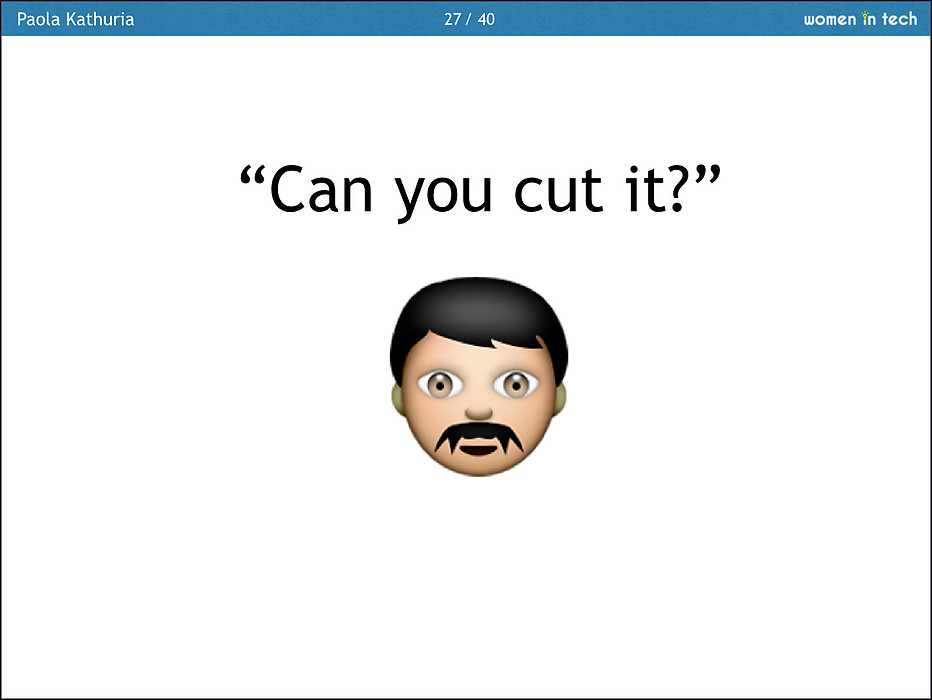
Back to 1991.
When the start-up didn’t succeed, I got a job at South Bank Poly to design and build a contacts database. I learnt HyperCard and FoxBASE, and used a Mac for the first time.
I was given the slowest computer. Each time I made a change to my code, I had to wait 20 minutes for it to compile before I could run it. I was asked to reorganise the filing at one point by my female manager.
I left after a year. It was not a good environment.
I quadrupled my salary the next week when I got a contract as a database developer at JP Morgan, the investment bank. They sent the three-person team on training for Omnis 7, a cross-platform front-end to Sybase.
At the interview, the manager sat back in his chair, his hands behind his head and his legs wide open. He asked me, "do you think you can cut it?"
I knew enough by then to know where this was coming from. I very quickly found out that I was just as accomplished, if not more so sometimes, than my male colleagues.
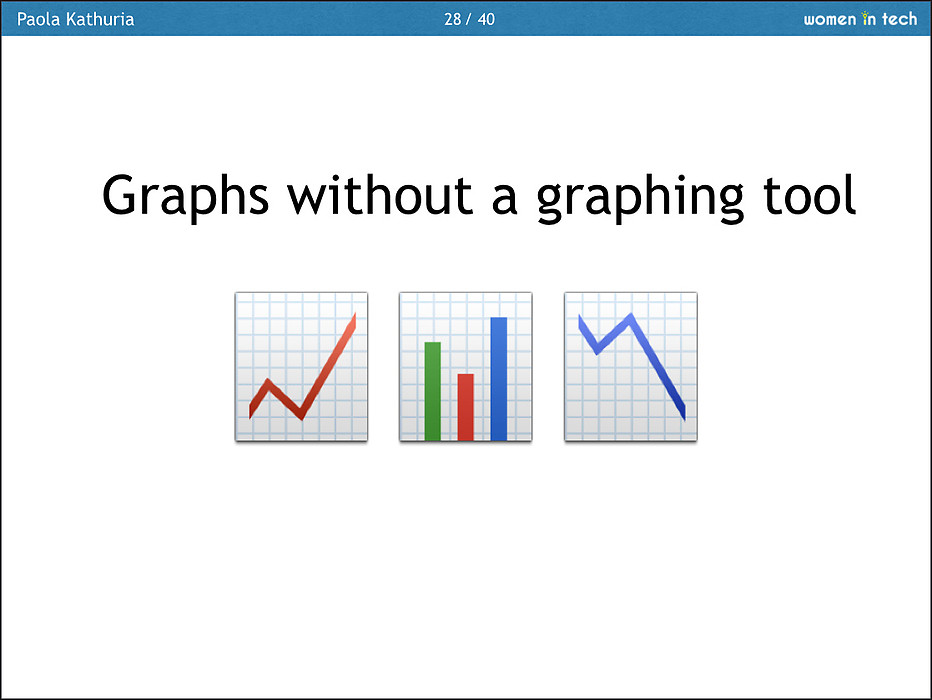
At the distillers Seagram, I ran the team to design and build a marketing planning system. They wanted to generate line graphs and bar charts from marketing data.
But Omnis 7 didn't have a graphing capability. I created template Omnis reports with flattened line graphs and flattened bar charts. I wrote code to inject values into these flattened objects to set heights and labels to simulate graphs and charts.
This is a microcosm of the computing industry: constantly having to learn new things. And constantly having to find new ways to apply existing tools to new problems.
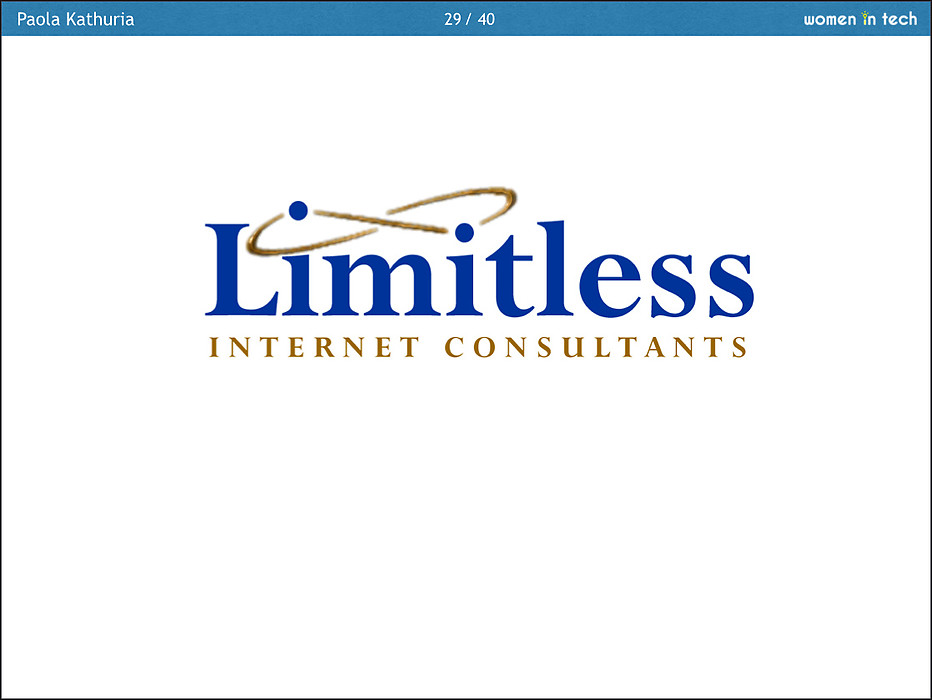
In 1995, I co-founded Limitless, one of the first web companies in the UK.
We didn’t have any investment. My two male business partners stayed in their computing contracts until the company could afford to pay them.
When Tesco announced that they were going to launch the UK’s first online wine-ordering system, Sainsbury’s asked if we could beat them. We designed and built an interactive wine-ordering system in a couple of weeks before scripting languages, SSL and state existed.
With Sainsbury’s on our portfolio - and at a time when most companies didn’t have a web site - people started to get in touch.
We used a company called Virtual Office to create the impression we had an office before we had the money to rent one. We bought a business address - 211 Piccadilly. When people called our office number, it was answered by Virtual Office with our company name. They would route calls to me at home.
I took all the calls from potential clients, asking them questions, finding out about them and what they wanted. I set up and attended meetings.
I also wrote proposals. I had a 44% success rate, double the average.

With all of us now full-time and in a new office at Limitless, I had set up a meeting with a flower delivery company who’d contacted us.
Two men from the company attended as well as me and my two male colleagues.
If we got the business, I would run the project: I’d define the requirements, design the user interface, hire graphic designers, do some development and manage the project.
Each time I asked the two male visitors questions, they looked at me blankly. They then turned to my male colleagues and addressed their answer to them.
None of us said anything at the time - but we didn’t take them on as a client.
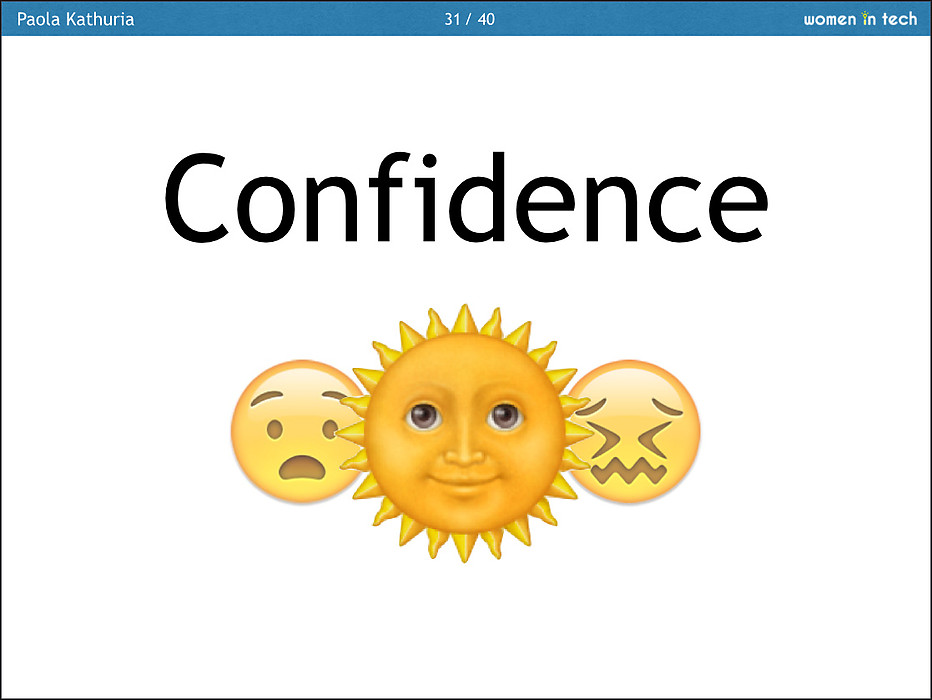
Whenever I asked my male colleagues technical questions, I’d always get an answer with the same level of assured confidence. However, I’d often find out later that the information was wrong. So I began to follow-up each question with: “do you know for a fact or are you guessing?”
We need to learn this neat trick, to come across as confident even when we doubt ourselves.
Don’t give people an excuse to doubt you. Because if you do, they will.
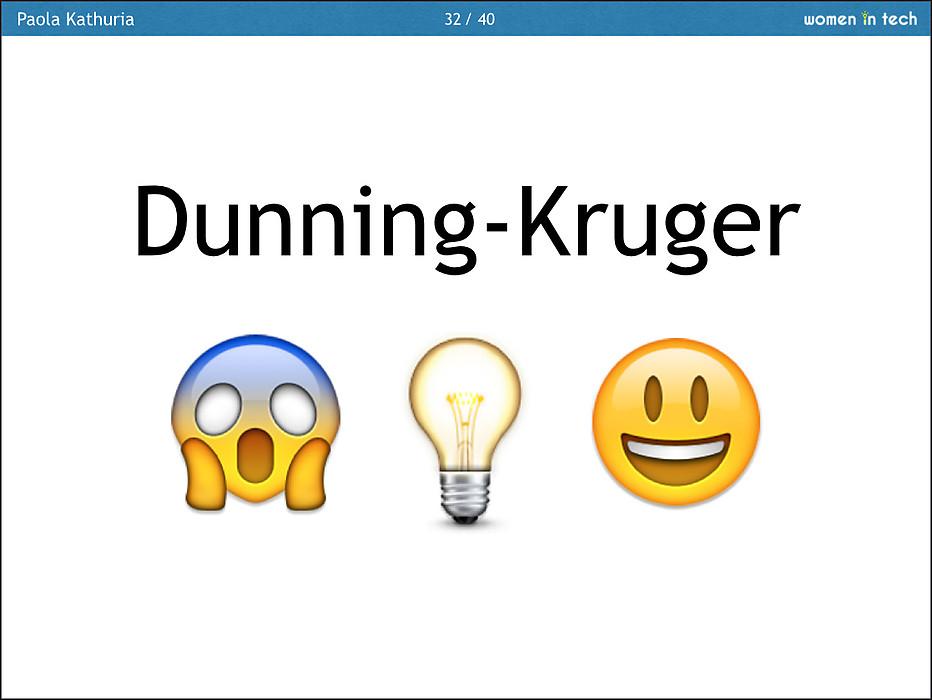
Psychologists Dunning and Kruger examined people’s self-assessment of logical reasoning skills, grammatical skills and humour.
They found that the unskilled tended to rate their ability much higher than their actual ability, while the highly skilled tended to rate their ability lower than their actual ability.
Did you get that? People who aren’t skilled at a task, think they’re much better than they really are. People who are very skilled think that they are worse at it than they really are.
After being shown their test scores, people were asked to estimate their own ability again: the competent group accurately estimated theirs, while the incompetent group still overestimated theirs.
That means, if you think you’re not smart, you very well may be smart!
Because to think you’re not smart means you can imagine beyond what you know. You can see questions that you don’t have the answers to. You recognise that some people know more than you.
This awareness means that you’re smart. People who aren’t smart think they’re the smartest because they are oblivious to what else is knowable.
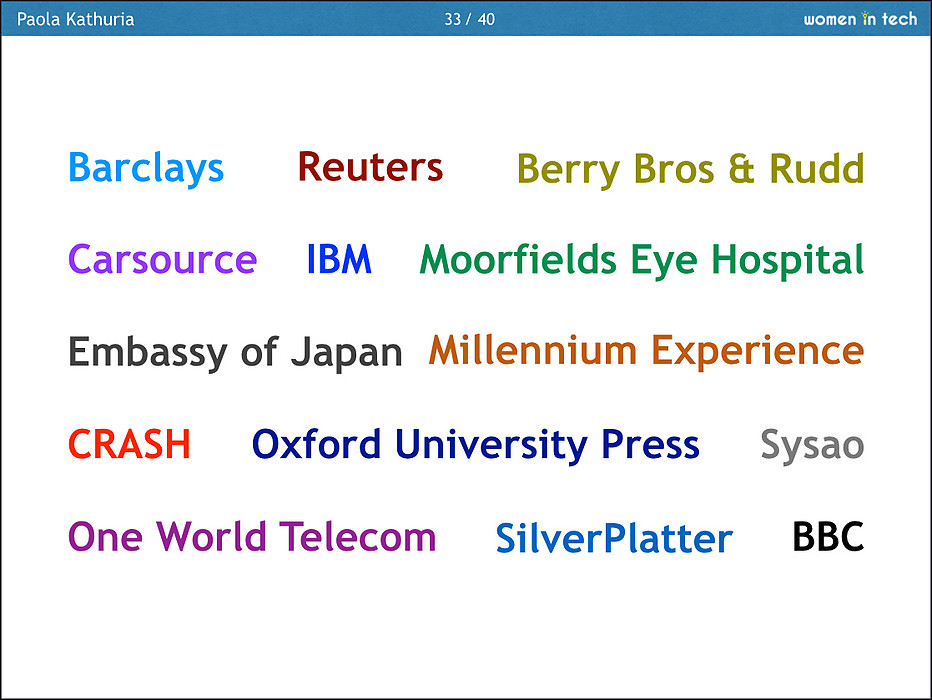
This represents 18 years working in my own companies, Limitless for five years, then Limitless Innovations.
I wrote winning proposals, hired and managed staff, ran projects, designed user interfaces, created content management systems, wrote hundreds of thousands lines of code and hundreds of pages of documentation.
I was able to maintain high quality and look after clients. In 15 years, we never had to go looking for business. Companies came looking for - and stayed with - us.
I had cancer four years ago. My hair turned blue.
After treatment, I returned to contracting for a couple of years. I wanted to see what it was like out there.
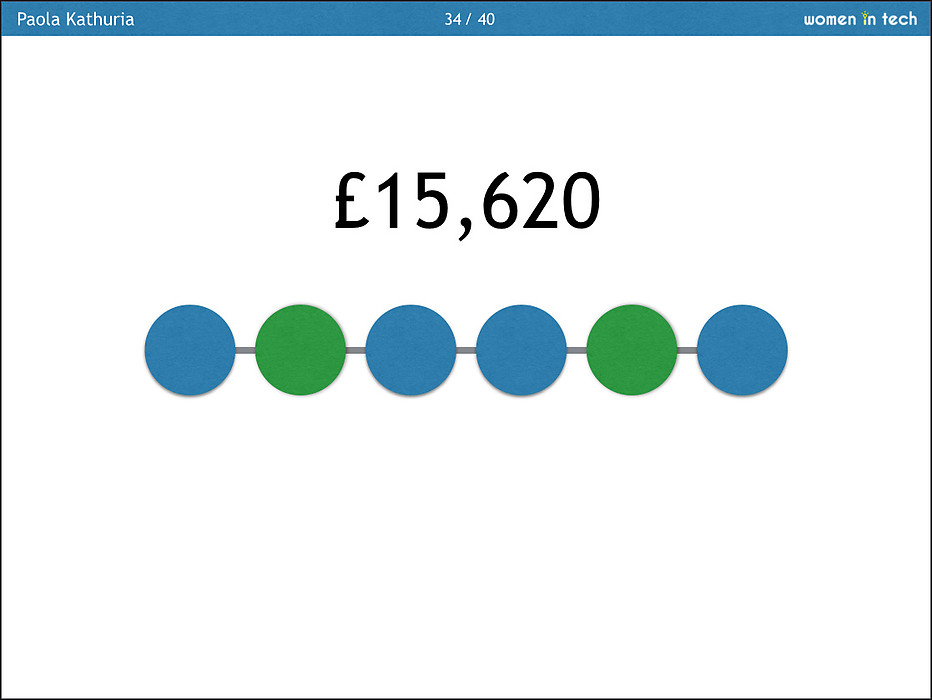
I have also sold over £15,000 of my own jewellery in an online shop I designed and built from scratch myself.
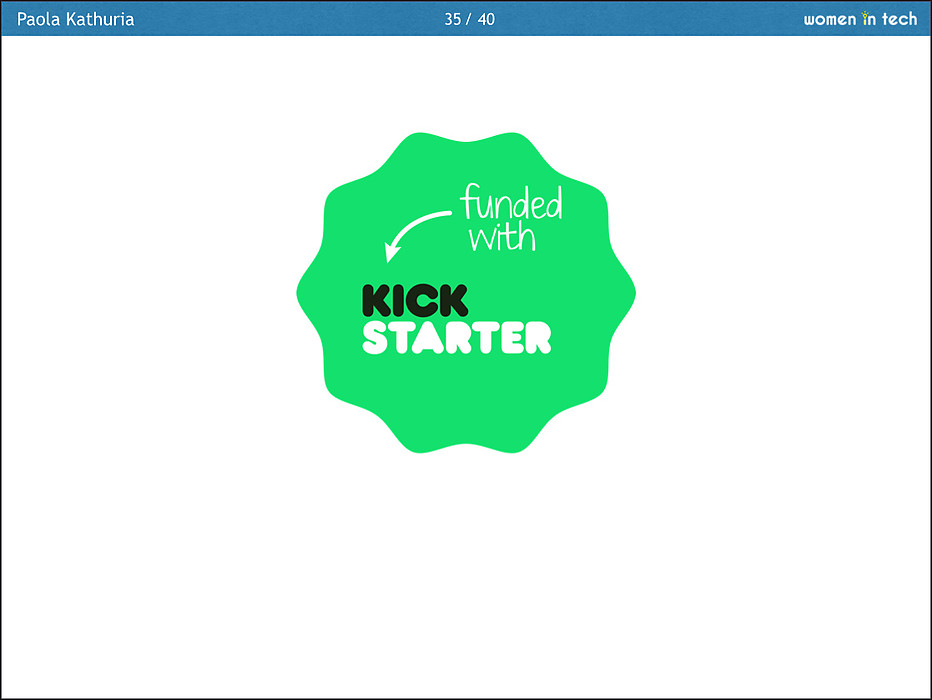
This year I ran a successful Kickstarter campaign to fund a book of short stories.
I’d originally written them 20 years ago for an online forum with a quarter of a million readers.
I learnt Audacity (to record/edit voice), iMovie (to make my campaign video), InDesign to create the book PDFs, and Sigil to make the ebooks.
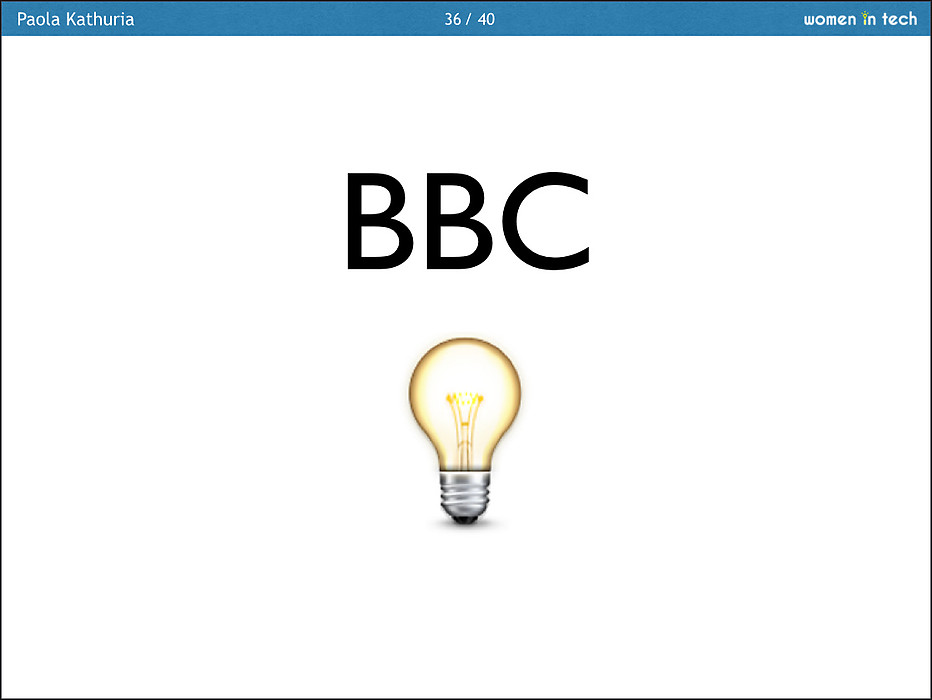
Today is just the third time I’ve chosen to stand up and talk in front of people in a public place.
I avidly avoided public speaking until a year ago because I was so bad at it.
For example, for two years running, my ideas for online services were picked by the BBC for their Innovation Labs - ten short-listed companies in a hotel for a week to work up our ideas with mentors, pitching to commissioners at the end of the week.
I was so bad at public speaking that I didn’t even stand up - let alone talk - during the pitch, even though we were pitching my ideas.
I just sat at the front, advancing the slides by pressing a button.
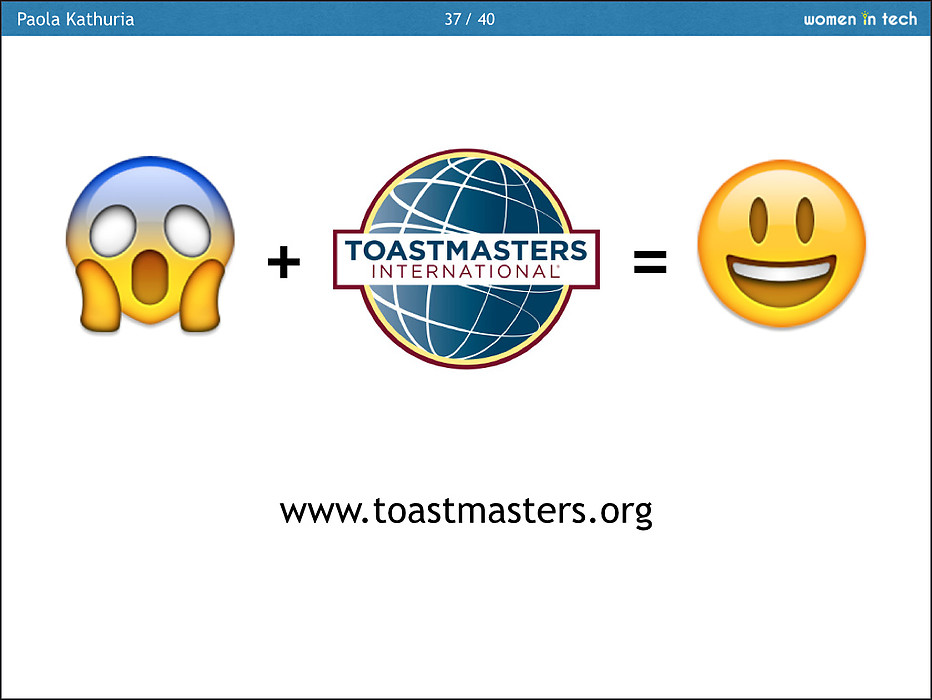
I joined Toastmasters, a public speaking club a year ago July. It’s a structured setting where you learn public speaking by watching and doing.
My first Toastmaster’s speech was surprisingly good. I realised that I had been my biggest critic and my worst enemy.
In believing that I was a bad public speaker, I created the fear and nerves that made me a bad public speaker.
By deciding to join Toastmasters, I had turned away from the door marked “I can’t do it” and I stepped through the door marked “I will learn to do it.”
I was immediately better.
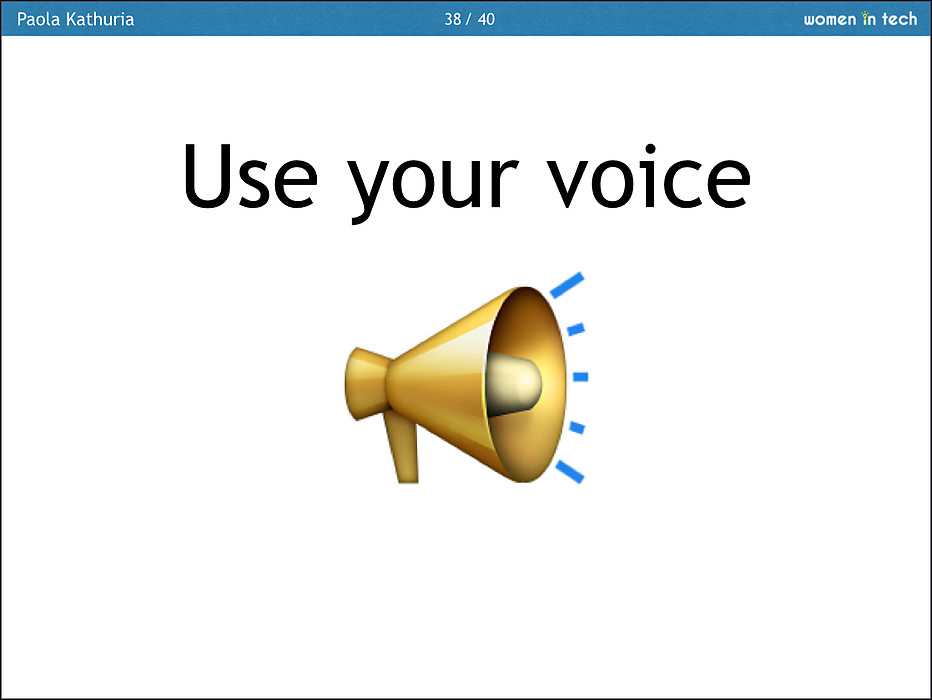
You - too - have a voice.
Use it.
There’s nothing special about my being here that you can’t do for yourself.
The hardest bit is realising and deciding that you can do it.

Because I … want to see you fly.
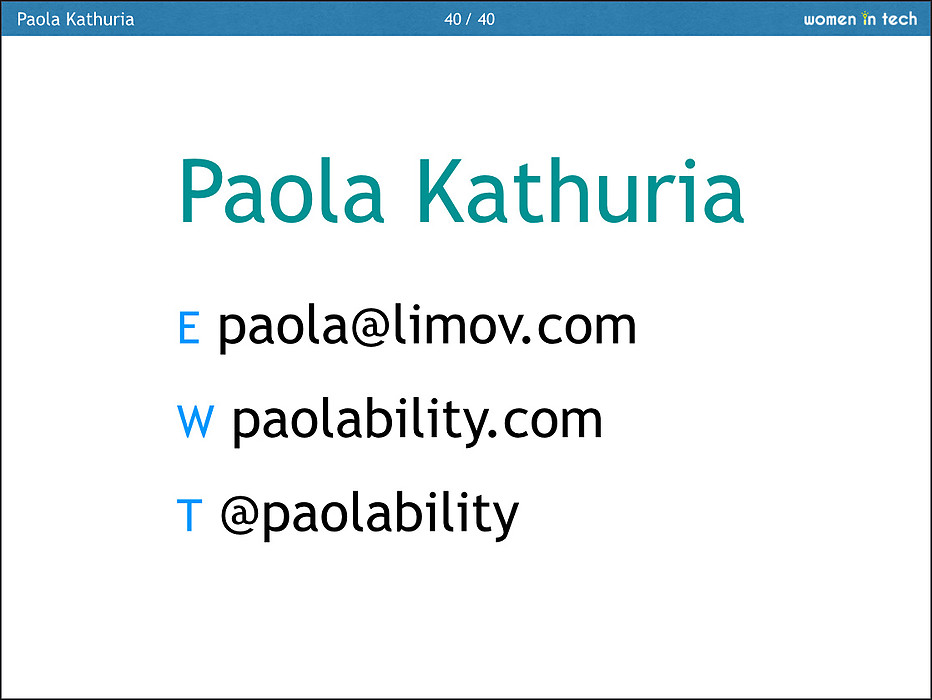
Comments (2)
Anonymous
says:I vividly remember careers advice at Tolworth girls school.
We were discouraged to think about university at all.It seems like another world.
>Sarah(formerly Elizabeth Benford)
paolability
says:Cripes, same school as me!